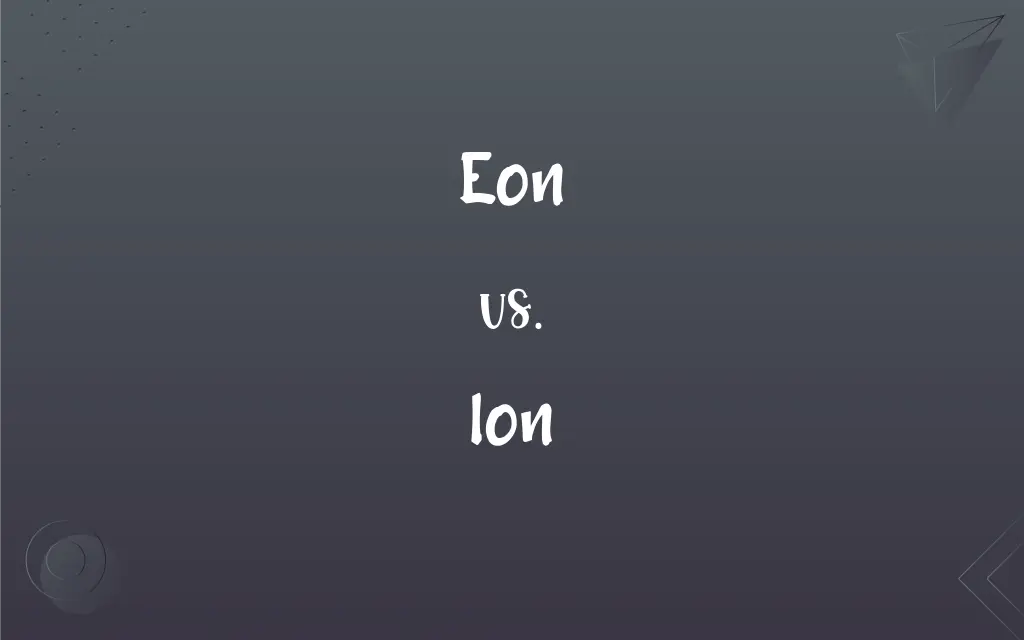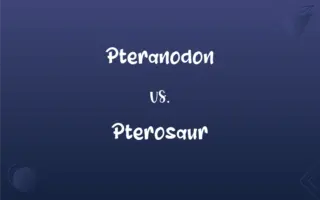Eon vs. Ion: What's the Difference?
By Aimie Carlson & Harlon Moss || Updated on May 20, 2024
An eon is an immeasurably long period of time, whereas an ion is an atom or molecule with an electric charge due to loss or gain of electrons.

Key Differences
An eon represents a vast span of geological time, often used in the context of Earth's history. It is the longest unit of geological time, dividing the history of the Earth into significant eras. On the other hand, an ion is a fundamental concept in chemistry and physics, referring to an atom or molecule that has gained or lost one or more electrons, resulting in a net electric charge.
Eons are primarily used in geology and paleontology to describe significant periods in Earth's history, like the Phanerozoic eon. They encompass millions or even billions of years. Ions, in contrast, are essential in the study of chemical reactions and physical processes, playing crucial roles in fields like electrochemistry and molecular biology.
While an eon can be subdivided into eras, periods, and epochs, providing a framework for understanding Earth's development over time, an ion can be classified based on its charge as either a cation (positive charge) or an anion (negative charge). This classification helps in understanding chemical bonding and reactions.
The concept of an eon helps geologists and paleontologists trace the Earth's history, climate changes, and the evolution of life over immense timescales. In contrast, ions are integral to understanding chemical properties and behaviors, such as conductivity, acidity, and the mechanisms of chemical reactions.
Eons reflect the macro scale of time, influencing theories about the origin of the Earth and life. Ions operate on the micro scale, affecting everyday chemical interactions, including those within our bodies and in various industrial processes.
ADVERTISEMENT
Comparison Chart
Definition
Longest division of geological time
Atom/molecule with an electric charge
Field
Geology, Paleontology
Chemistry, Physics
Subdivision
Eras, periods, epochs
Cations (positive), anions (negative)
Timescale
Millions to billions of years
Atomic/molecular level
Role
Tracing Earth's history
Chemical reactions and properties
ADVERTISEMENT
Eon and Ion Definitions
Eon
An immeasurably long period of time.
The formation of the Earth occurred over eons.
Ion
A particle with unequal numbers of protons and electrons.
Hydrogen ions are critical in determining pH levels.
Eon
In formal scientific usage, it refers to specific intervals in Earth's history.
The Archean eon is one of the earliest in Earth's history.
Ion
Key in chemical reactions and conductivity.
Battery function relies on the movement of lithium ions.
Eon
A term indicating vast expanses of time in both science and casual contexts.
Technology has evolved significantly over the past few eons.
Ion
Can be positively or negatively charged.
Calcium ions play a crucial role in muscle contractions.
Eon
A major division of geological time.
Dinosaurs lived during the Mesozoic eon.
Ion
An atom or molecule with an electric charge.
Sodium chloride dissociates into sodium and chloride ions in water.
Eon
Often used to emphasize a long duration.
It feels like an eon since we last met.
Ion
Formed through the loss or gain of electrons.
Chlorine gains an electron to become a chloride ion.
Eon
An indefinitely long period of time; an age.
Ion
An atom or a group of atoms that has acquired a net electric charge by gaining or losing one or more electrons.
Eon
The longest division of geologic time, containing two or more eras.
Ion
An atom or group of atoms bearing an electrical charge, such as the sodium and chlorine atoms in a salt solution.
Eon
(US) Eternity.
Ion
An atom or goup of atoms (radical) carrying an electrical charge. It is contrasted with neutral atoms or molecules, and free radicals. Certain compounds, such as sodium chloride, are composed of complementary ions in the solid (crystalline) as well as in solution. Others, notably acids such as hydrogen chloride, may occur as neutral molecules in the pure liquid or gas forms, and ionize almost completely in dilute aqueous solutions. In solutions (as in water) ions are frequently bound non-covalently with the molecules of solvent, and in that case are said to be solvated. According to the electrolytic dissociation theory, the molecules of electrolytes are divided into ions by water and other solvents. An ion consists of one or more atoms and carries one unit charges of electricity, 3.4 x 10-10 electrostatic units, or a multiple of this. Those which are positively electrified (hydrogen and the metals) are called cations; negative ions (hydroxyl and acidic atoms or groups) are called anions.
Eon
A period of 1,000,000,000 years.
Ion
One of the small electrified particles into which the molecules of a gas are broken up under the action of the electric current, of ultraviolet and certain other rays, and of high temperatures. To the properties and behavior of ions the phenomena of the electric discharge through rarefied gases and many other important effects are ascribed. At low pressures the negative ions appear to be electrons; the positive ions, atoms minus an electron. At ordinary pressures each ion seems to include also a number of attached molecules. Ions may be formed in a gas in various ways.
Eon
(geology) The longest geochronologic unit, being a period of hundreds of millions of years; subdivided into eras.
Ion
A particle that is electrically charged (positive or negative); an atom or molecule or group that has lost or gained one or more electrons
Eon
A long period of time.
It's been eons since we last saw each other.
Eon
A spirit being emanating from the Godhead.
Eon
An immeasurable or infinite space of time; eternity; a long space of time; an age.
The eons of geological time.
Eon
One of the embodiments of the divine attributes of the Eternal Being.
Among the higher Æons are Mind, Reason, Power, Truth, and Life.
Eon
The longest division of geological time
Eon
An immeasurably long period of time
Eon
(Gnosticism) a divine power or nature emanating from the Supreme Being and playing various roles in the operation of the universe
FAQs
What is an eon?
An eon is the longest division of geological time, encompassing millions to billions of years.
What is an ion?
An ion is an atom or molecule with a net electric charge due to the loss or gain of electrons.
What are the types of ions?
Ions can be cations (positively charged) or anions (negatively charged).
What is an anion?
An anion is an ion with a negative charge, formed by gaining electrons.
What is the duration of an eon?
Eons span millions to billions of years.
What role do ions play in chemistry?
Ions are crucial in chemical reactions, conductivity, and forming compounds.
What is a cation?
A cation is an ion with a positive charge, formed by losing electrons.
How is an eon used in geology?
Eons are used to categorize large spans of Earth's history into major time intervals.
What is the difference between an eon and an era?
An eon is a larger division of time, whereas an era is a subdivision within an eon.
How is an ion formed?
Ions are formed when atoms or molecules lose or gain electrons.
What is the significance of ions in biology?
Ions are vital in biological processes like nerve impulse transmission and muscle contraction.
Can you name an example of an eon?
The Phanerozoic eon is a well-known example, representing the current eon in Earth's history.
Can you name an example of an ion?
A common example of an ion is the sodium ion (Na+).
What is the charge of an ion?
The charge of an ion can be either positive (cation) or negative (anion).
Can eons be further divided?
Yes, eons can be divided into eras, periods, and epochs.
How do eons relate to the geologic time scale?
Eons are the largest units in the geologic time scale, setting the framework for Earth's history.
How do ions affect pH levels?
The concentration of hydrogen ions (H+) determines the acidity or alkalinity of a solution.
How many eons are recognized in Earth's history?
Four primary eons are recognized: Hadean, Archean, Proterozoic, and Phanerozoic.
What is the significance of the Phanerozoic eon?
The Phanerozoic eon is significant for encompassing the current and most recent interval of visible life on Earth.
What is an ion's role in electrochemistry?
Ions conduct electricity in solutions, crucial for electrochemical reactions.
About Author
Written by
Aimie CarlsonAimie Carlson, holding a master's degree in English literature, is a fervent English language enthusiast. She lends her writing talents to Difference Wiki, a prominent website that specializes in comparisons, offering readers insightful analyses that both captivate and inform.
Co-written by
Harlon MossHarlon is a seasoned quality moderator and accomplished content writer for Difference Wiki. An alumnus of the prestigious University of California, he earned his degree in Computer Science. Leveraging his academic background, Harlon brings a meticulous and informed perspective to his work, ensuring content accuracy and excellence.































































